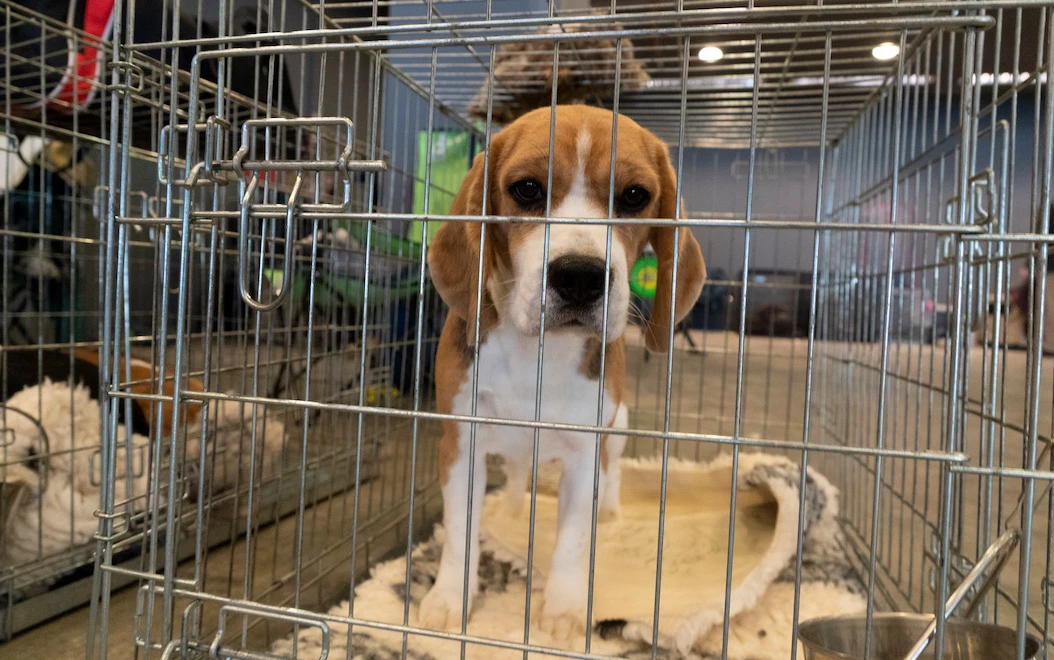Ridglan Farms’ abuses highlight yet one more example that beagle procurement leads to inhumane treatment, poor testing results
Washington, D.C. — Animal Wellness Action, the Center for a Humane Economy, People for the Ethical Treatment of Animals (PETA), Rise for Animals, and other advocacy groups are urging the National Institutes of Health (NIH) and the U.S. Food and Drug Administration (FDA) to suspend all use of federal funds to procure beagles from Ridglan Farms, a Wisconsin-based commercial dog breeder repeatedly cited for animal cruelty, and to deny funding to any grantee using beagles in its testing regimen.
Last week, Ridglan Farms agreed to relinquish its state license to breed and sell dogs as part of a settlement with state officials to avoid criminal animal cruelty charges. The deal, announced by the special prosecutor investigating the company, allows it to continue operating through July 1, 2026, prolonging the suffering of hundreds of dogs despite overwhelming evidence of systemic abuse. The coalition is pushing for the immediate release and adoption of these dogs and pressing NIH to prohibit the use of federal funds for any future procurement from the facility.

In a letter signed by leaders of multiple animal welfare groups to NIH and FDA leaders, the coalition cited court documents, state inspection reports, and veterinary evidence showing that Ridglan conducted invasive surgical procedures on conscious dogs without anesthesia or pain relief. The coalition also referenced NIH’s history of funding the procurement of dogs from the embattled dog breeder.
The groups noted that the Ridglan abuses were similar to those discovered at the Virginia-based Envigo in 2022. The U.S. Department of Justice seized 4,000 dogs and secured a record $35 million settlement only after years of government inaction.
“Ridglan Farms is the latest beagle breeding operation to be exposed as a house of horrors for the dogs,” said Wayne Pacelle, president of Animal Wellness Action. “Federal agencies that are leading the move towards human-relevant nonanimal science must now think about the supply chains for its grantees and proscribe procurement of beagles for government-funded projects.”
Federal Inaction Undermines NIH and FDA Modernization Goals
The groups emphasized that continued federal support for Ridglan Farms contradicts NIH and FDA commitments to move away from animal testing toward advanced, human-relevant methods.
The FDA recently unveiled its Roadmap to Reducing Animal Testing in Preclinical Safety Studies, while NIH announced the creation of the Office for the Verification, Innovation, and Reduction of Animals in Research (OVIRA) and a new national Organoid and Tissue Chip Center to promote human-based science.
“NIH and FDA have committed to a national transition toward humane, human-relevant science. Continuing to provide funding for dogs from a facility repeatedly violating basic animal cruelty laws undermines those very modernization goals,” said Tamara Drake, director of research and regulatory policy at the Center for a Humane Economy. “These forward-looking agencies have announced game-changing new policies, but they must be applied in a consistent and thorough manner.”
“Ridglan Farms’ conduct has been deemed criminal by Wisconsin authorities, and now federal funds must stop flowing to institutions that buy dogs from this facility,” said Kathy Guillermo, senior vice president at PETA. “NIH and FDA have both pledged to move away from animal testing—ending contracts with a breeder that performs surgeries on unanesthetized conscious dogs would further that commitment.”
“Every dollar the NIH spends at Ridglan Farms bankrolls a system built on animal suffering,” said Ed Butler, executive director at Rise for Animals. “Ridglan isn’t a rogue breeder. It’s part of a taxpayer-funded pipeline that packs dogs into crates, ships them to labs, and pays for their mutilation under the guise of research. The NIH’s own policies promise a future beyond animal experimentation—one grounded in modern, human-relevant science—but that future will never come while it keeps paying for cruelty.”
Along with asking the NIH to stop federal funding for the procurement of dogs from Ridglan Farms, they urged NIH to notify all NIH-funded institutions that such procurement is ineligible for reimbursement. They also requested that NIH conduct a review whether these violations breach NIH policies on ethical sourcing in federally funded research.
Congress accelerated the shift towards humane nonanimal test methods through the FDA Modernization Act 2.0 (2022), which lifted the 84-year-old federal mandate for animal testing for all new drugs. The pending FDA Modernization Act 3.0 would further embed these reforms across federal research agencies, a move strongly supported by the coalition behind this call to action.
Our nation should have learned from the horror show at Envigo. Ridglan Farms is just one more cog in a broken, inhumane system of outdated and unreliable drug testing.
Additional Statements from Coalition Leaders
“The NIH should not be complicit in cruelty by funding experiments that rely on dogs from Ridglan Farms, a facility long associated with suffering and inhumane treatment. Taxpayer dollars must support modern, ethical science, not the perpetuation of animal abuse,” said Rebekah Robinson, president of Dane4Dogs.
“We’ve seen firsthand what these dogs have endured after being rescued from laboratory supply chains like Ridglan. No animal should be bred for a life of confinement and suffering — this system must end,” said Shannon Keith, founder and president of the Beagle Freedom Project.
“It is a fundamental breach of the public trust and a betrayal of basic scientific ethics for the NIH to fund an operation that has repeatedly violated animal cruelty laws,” said Wayne Hsiung, executive director of The Simple Heart.

